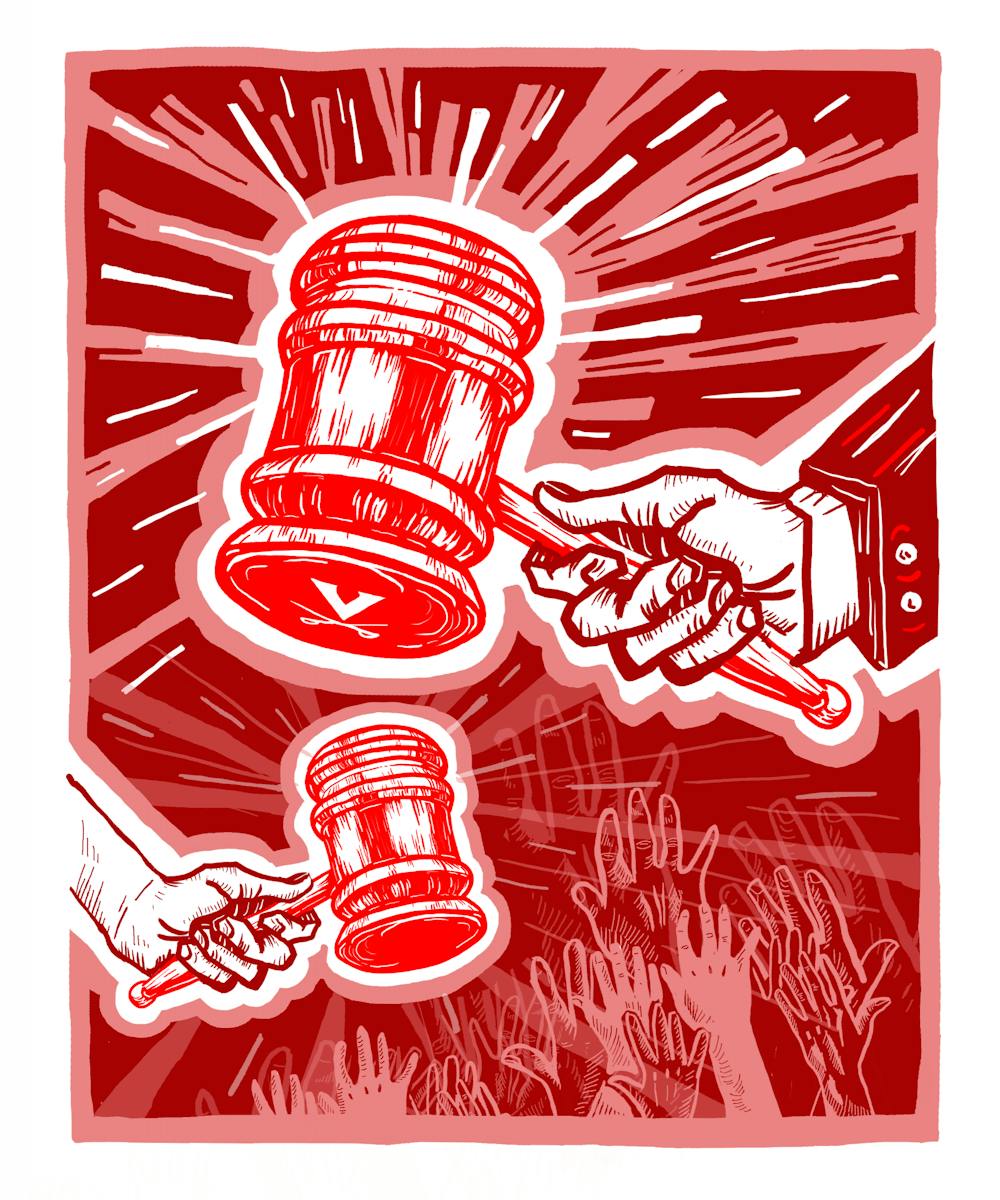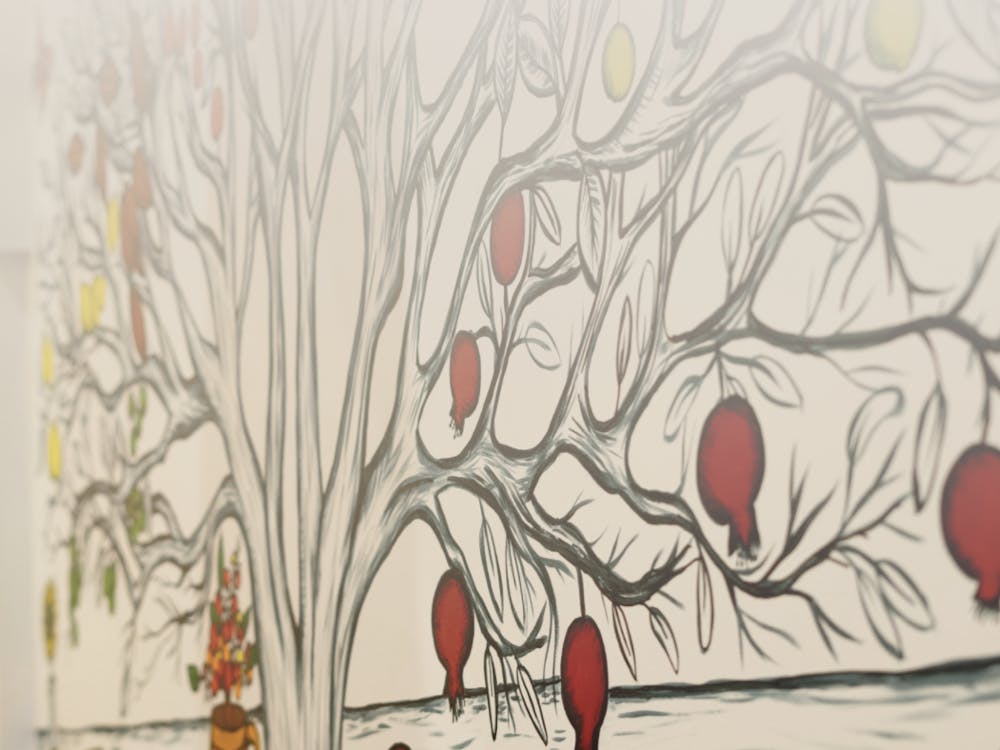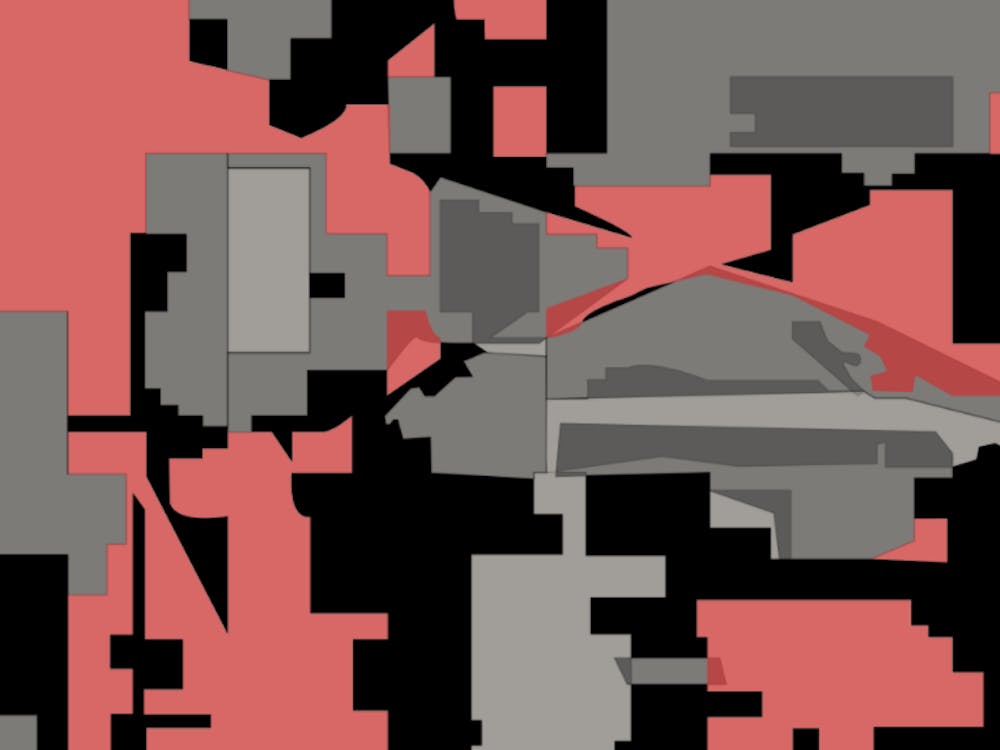LOOKING BACK, LOOKING FORWARD
As of the first week of March, the University had tracked over 3,000 COVID-19 cases.
Emails from members of the University administration regarding the fall 2020 and spring 2021 semesters emphasized the importance of student self-governance and the Community of Trust. In an email to the student body last summer, Dean of Students Allen Groves called behavior of students at midsummers “selfish and ignorant” while highlighting the concept of community of trust — the idea that all University students are trusted to maintain morally sound ideals.
The University has placed much responsibility on its students this past year, urging individuals to choose to abide by COVID-19 guidelines. There are serious consequences to those who do not uphold the community of trust — including temporary interdisciplinary suspensions from the University for egregious violations and a University Judiciary Committee trial for actions that violate University, state or local COVID-19 restrictions.
Now is a good time to dive deeper into the Community of Trust and the institutions that play a role in its enforcements, to further understand the University’s approach to the fall 2020 and the spring 2021 semesters.
WHAT IS STUDENT SELF-GOVERNANCE?
Community trust is meant to foster the idea that every student is a part of something bigger than themselves at the University, and student self-governing bodies are meant to uphold this idea.
“The Honor System, in the end, is just the adjudicatory body, while the Community of Trust itself is comprised of every single student, faculty member, administrator and community member who comes into contact with U.Va. students,” said Isabelle Edwards, vice chair for communications on the Honor Committee and fourth-year student in the Curry school, in an email to The Cavalier Daily.
Meanwhile, student self-governance is less straightforward.
“Student self-governance is a more abstract or meta idea of how students self-govern,” said Noah Strike, Director of University Relations for Student Council and third-year College student. “For example, the Living Wage Campaign for the past two decades has been doing a lot of things that I think traditionally wouldn’t be considered self-governance. Holding a rally outside the Board of Visitors is absolutely an example of self-governance.”
When it comes to self-governance, the University often highlights three main organizations, though student leaders believe the concept extends well beyond that.
“The University points to the University Judiciary Committee, Honor Committee and Student Council [when it comes to self-governance],” said Abel Liu, chair of Student Council’s representative body and third-year College student. “Honestly, though, the area where I personally see students picking up the University’s slack the most has to be in engaging, retaining and welcoming marginalized students. Immediately, I think of undocUVA, Muslim Institute for Leadership and Empowerment, Latinx Leadership Institute and the Black Presidents Council.”
As already mentioned, often the three examples of student self-governance on Grounds are Honor Committee, UJC and Student Council. The Honor Committee tries students who break the Honor Code — unlike most universities which hire administrators to handle student violations — while UJC investigates alleged violations of the University’s Standards of Conduct such as physical assault or any other violation of a local, state or federal law. Student Council is meant to protect and improve the opportunities and quality of life for every student through assisting with student activities on Grounds, passing legislation and approving the financial distribution of student activities fees, among other duties.
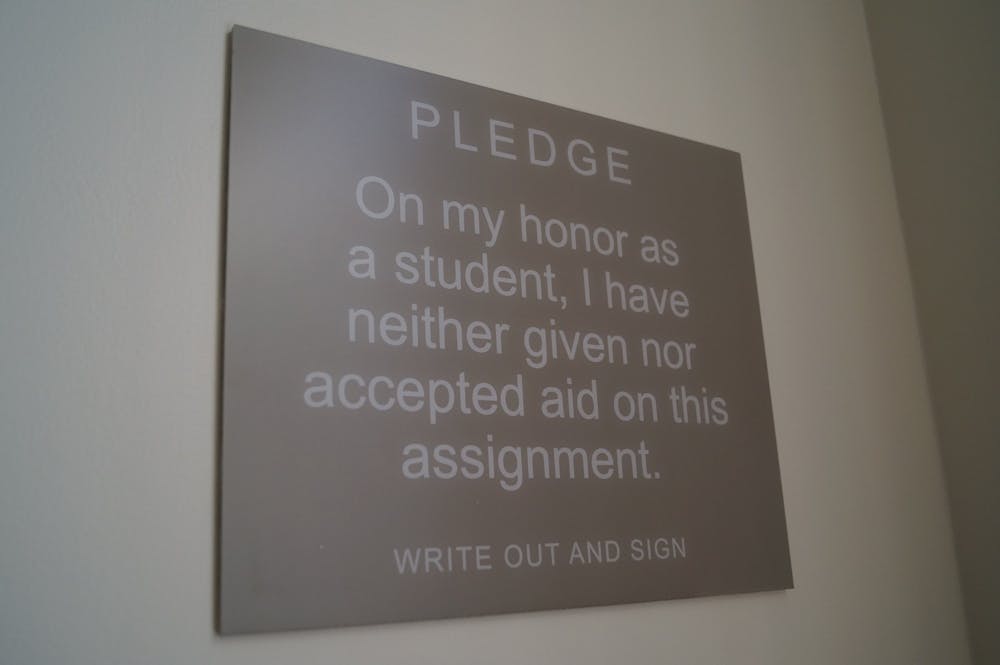
Courtesy Sophie Roehse
“The true power of student government is in its ability to formally represent student interests,” Liu said. “Think of StudCo as a medium for student collective bargaining powers. StudCo may be an institution, but do not mistake the body’s formal powers as its only potential … I wish that StudCo would be called the University of Virginia Student Union.”
Student self-governance is often discussed as a Jeffersonian idea, and its history is extensive. As described on Student Council’s website, in 1954, 11 male students were suspended — and four recommended for expulsion — after assisting in the rape of a 19-year-old woman in an East Lawn room. Protests broke out among students, who said the punishment for the rape was too harsh and called for more power to be given to the student body. Even though Stud Council’s judicial powers were initially revoked, seven months later, UJC was created, giving more power to the students. Those claiming that punishment for the rape were too harsh had obtained what they desired.
In 2019, Jia Tolentino, Class of 2009 alumna and writer for The New Yorker, published “Trick Mirror: Reflections on Self Delusion,” a collection of essays. In an essay entitled “We Come from Old Virginia,” Tolentino writes that the students “formed a Judiciary Committee that would ‘return the disciplinary power of the president’s office to the student body.’”
Tolentino goes on to write that self-governance, including UJC, is one of the University’s “proudest practices.” But she also argues that by not admitting to UJC’s problematic origins, and instead only speaking of the uniqueness of an organization like UJC, the University continues to harbor a fake image of itself.
“The school’s self-conception will never be completely true until it can admit the extent to which it has always been fake,” she wrote.
DIVERSITY AND INCLUSION WITHIN SELF-GOVERNANCE
“[Community trust] has been a student sourced and student maintained idea,” Strike said. “If an administrator told us to not steal things, people wouldn’t really listen. We all elect officials to Honor, we all sign the Honor scrolls at convocation, we are all committing to this idea of Community Trust … Community trust has been built for 200 years. It is ingrained in the student conscious.”

Courtesy Sophie Roehse
In its simplest form, the University’s community of trust allows students to leave their laptop in the library and not worry about it being stolen while they are going to the bathroom or to get coffee.
However, this idea of Community Trust, Strike said, is surrounded by a lot of “disillusionment and general disinterest in the concept of self-governance.”
“I think there are a lot of really valid reasons for that, like students of color often talk about how Honor and UJC have very poor histories with the percentage of students of color that are expelled versus white students,” Strike said.
In 2019 Honor released its Bicentennial Report — the largest internal review of case outcomes ever conducted by the Committee, featuring data from a century of annual dismissals and three decades of data on sanctions. The report showed there has historically been a disproportionately high sanction rate for students of color, especially African and Asian American individuals.
For example, Asian American students comprised half of all sanctions between 2012 and 2017, but only comprised 12 percent of the student population. In addition, between 1987 and 1989, Black students comprised 42 percent of sanctioned students while the Black student population was only around 9 percent.
In its demands — published in summer 2020 — to the University, Black student activists called “upon the Honor and University Judiciary Committees to commit more of their time and resources investigating racial biases present in case litigation and increasing the presence of Black, Indigenous and people of color in each institution.”
Edwards said that up until summer 2020, discussions regarding race were often sparse.
“Small discussions were more frequent, often bringing up the fact that Honor has struggled with diversity, but then quickly dissipating after there’s a mention of how we haven’t figured out how to handle our lack of diversity,” Edwards said.
Edwards also said in summer 2020 — after Honor received backlash from the University community after it remained silent following the murders of George Floyd and Breonna Taylor — the committee put forth a set of four actions which will revamp Honor processes and recruitment to better reach students of color.
“It’s definitely the biggest change we’ve initiated in regard to diversity and inclusion in my time with Honor,” Edwards said.
Edward explained that one of the measures was requiring everyone in Honor to read “So You Want to Talk About Race” by Ijeoma Oluo. In addition, Honor began showing live demographics of case data and connecting more closely with other CIOs and continued communication with endorsed organizations. The statement also says Honor will continue to put out more comprehensive measures moving forward. However, as of January 2021, no other measures have been released.
“We are beginning to look into our options for dealing with potential biases connected to reports once the case is in our system, but we don’t have any concrete plans to announce just yet,” Edwards said.
Meanwhile, in the past semester, “every UJC member was required to be present for mandatory bias training,” said Gabby Cox, Chair of UJC’s Executive Committee and fourth-year Batten student, in an email to The Cavalier Daily.
The bias training was composed of two parts, one presented on “Preventing and Addressing Discrimination, Harassment, and Retaliation,” which was given by the Office of Equal Opportunity and Civil Rights, and the second entitled “A Diversity, Equity, and Inclusion” presentation given by Associate Dean of Students Tabitha Enoch.
Cox also explained how UJC senior support officers also had a differing approach to addressing diversity and inclusion, such as discussing ways UJC can “improve [their] image of inclusivity,” and “what communities [they] have done a less than adequate job recruiting from.”
Meanwhile, Student Council is seeking similar action.
“I think one solution is really straightforward — U.Va. students as a whole need to elect BIPOC students to positions of leadership,” Liu said. “All leaders of U.Va.’s self-governing bodies need to center BIPOC voices and prioritize appointing BIPOCs … I have prioritized engaging and retaining representatives of color as a person of color myself.”
Liu also said the 2020-2021 Representative Body is Student Council’s first “majority minority” body, meaning that more than 50 percent of the body is composed of representatives from historically underrepresented groups.
“A majority minority rep body was possible because we retained several of our BIPOC representatives from 2019-2020, and many of the body’s 2020-2021 vacancies were filled with BIPOC students,” Liu said. “It is my single proudest accomplishment from my time as chair of the representative body, and [it is a strong indication that more] change is coming.”
THE TRUE POWER OF SELF-GOVERNANCE
Strike spoke about times where the University often leads students in circles, pretending to cooperate with self-governance bodies in order to save face.
“A fantastic example of that is the Tuition and Fees Committee, where the Student Council president is responsible for appointing three of four students to the tuition and fees committee,” Strike said. Although the Studco committee reviews the proposal, “by the time the committee is reviewing the proposal, it’s already been submitted to the Board of Visitors, so they are basically letting the committee give input after the fact.”
Liu agrees that self-governance at the University is often understood as an all-powerful entity, yet the students have less power than originally led to believe
“No Student Council branch is able to exercise direct and totally unsupervised authority over any area of student life,” Liu said. “We have no magic wand. This is not to say that the powers and tools that we do have have no bite — they do. However, one small part of the problem with Student Council is the government frame we use to describe it. Our language in [regards to] the status quo just creates confusion and disappointment.”
When asked about increasing the power or autonomy of self-governing bodies, Liu pointed out the University should better fund Student Council.
“The University could further empower StudCo’s policy making abilities by funding the organization beyond student activity fees money,” Liu said. “Such increases could be used to expand our resource units like the Community Food Pantry, Student Legal Services, U.Va. Mutual Aid, etc. These services address real gaps in basic student welfare at U.Va. and are the types of services that the University should fund itself.”
In addition, the University could also include students in more of its decisions.
“The University could increase our body’s autonomy by integrating students into its decision making processes earlier. And then actually listening to them. In my experience, students — besides the Student Member of the Board of Visitors — are generally asked to give feedback on decisions that have already been made,” Liu said.
However, as Liu pointed out, a lack of complete autonomy can be changed.
“A student institution’s autonomy isn’t just controlled by the U.Va. Administration. That would be some weird oxymoronic passive autonomy... Any institution can increase its own autonomy. In the context of StudCo, to obtain greater autonomy, we really need to focus on gaining more leverage. Increasing StudCo’s leverage could be done through FOIAs, strikes, coalitions, community engagement, bad press, etc,” Liu said.
“Student Council can also increase its own autonomy and impact by building systems of dual power with groups that have the capacity to organize and engage in widespread direct action,” Liu also explained. “For example, we partnered with the First-Generation Low-Income Partnership at U.Va. and YDSA to advocate for a CR/GC/NC grading option for the 2020-2021 Academic Year.”
The partnership proved successful.
“We were far more effective working together than any one group would have been in isolation. Student Council has a unique ability to facilitate negotiations with administrators, collect data, and offer ‘institutional support’ for policy efforts,” Liu said.
The CR/GC/NC grading option was added to both the fall 2020 and spring 2021 semesters.
“Those tools, combined with direction action and organizing efforts, represent a substantial challenge to the dominant administrative power structures at the University,” he added.
A NEBULA
Strike discussed how there are a lot of misconceptions surrounding exactly how and what self-governance means at the University.
“While the growth does show that student self-governance has been historically successful, along with that growth, it has become more inaccessible,” Strike said. “Honor, UJC and StudCo have become so big and complicated that the average student doesn’t have time to digest what the differences are and what each of them does. It is just so nebulous that it is not accessible anymore.”
As for Student Council, “[it] needs to better articulate and publicize the meaningful work that we do” Liu said.
“If all I knew about StudCo came from CavDaily, I wouldn’t want to join either,” he added. “I’ll own a lot of the criticisms of self-governing bodies, but the charge that we do nothing is fictitious. Our organization needs to crack the code on how to effectively communicate to over 20,000 students, and that’s really hard. My biggest frustration is that people think that Student Council ‘doesn’t do anything.’”
This sense of disillusionment and lack of understanding in the self-governing system can contribute to low turnout and disinterest in self-governance. For example, students voting for Student Council president have steadily decreased since 2017, and in 2019 only 10 percent of the student body participated. In addition, Honor requires only 10 percent of students to vote on amendments for them to be adopted.
Edwards emphasized the lack of student turnout.
“One thing that would increase our productivity would be better knowledge of what the student body wants to see from us — talking to us at education events, voting in student elections in February and giving community input at committee meetings,” Edwards said. “We can’t do what the student body wants if the student body doesn’t tell us what they want.”
For the self-governing systems to work as they were meant to, members of the self-governing groups ask fellow students to take action.
“It is incredibly important that every student actively engages in self-governance in some way, so whether that is lobbying the administration or voting in student elections,” Strike explained.
STUDENT LABOR
“A majority of colleges do provide some form of compensation to the student government,” Strike said.
Around 77 percent of student leaders at other colleges around the country are compensated for their work, making the University an outlier. For example, at Georgia Tech, the Speaker of the House makes $2,450 a year and the president makes $8,000 a year. At the University of New Orleans, all student government officers are compensated. For many low-income students, this free labor at U.Va. can pose a barrier.
“I work 20 to 30 hours a week for Student Council for free,” Liu said. “I am able to do so because of my own privilege … Student self-governance equating to free labor just adds another barrier for [First Generation Low Income] students to participate”
Edwards says she never truly thought about receiving compensation before.
“I’ve seen my position as a form of public service — I want to contribute as directly as possible to the morals and ideals that create the Community of Trust and make the system more fair and just,” she said.
Similarly, Cox echoed a similar sentiment when asked about compensation.
“I did not run for this position with the hope of being compensated or even recognized,” Cox said. “My intent was to serve as a fair and effective leader of an organization that is given the responsibility to adjudicate violations of the standards of conduct.”
However, Cox also pointed out her position became a full-time job with the additional COVID-19 compliance cases. In the fall 2020 semester, of the 23 cases handled by UJC, 9 cases involved COVID-19 policies.
“The toll of being a full time student while simultaneously spending at least 20 hours a week on one organization, working another job, as well as other organizational commitments has taken a toll on my mental, emotional and physical health. This year has been arguably exponentially more taxing for student leaders than the past,” Cox explained. “Speaking for myself and myself alone, compensation is not what I request but more communication with those in high positions at the University.”
Cox explained that while she doesn’t feel that she is entitled to certain privileges, she does wish the University could make more of an effort to understand the challenges leaders of self-governing organizations face.
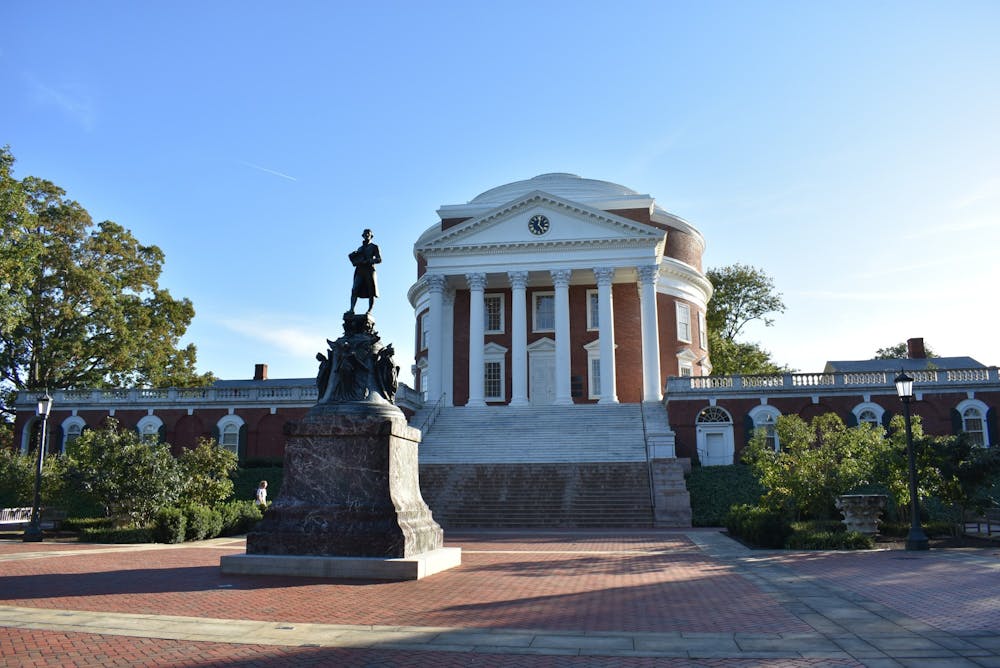
Courtesy Ava Proehl
Often, at other universities that do not provide direct compensation, student government is given additional, paid staff to help and manage the work. For example, at James Madison University, additional staff assists in managing and assisting students in starting up and joining clubs.
However, at the University, Student Council is in charge of those tasks.
For students who need to work in order to support themselves through college, Honor can seem unreachable due to the time commitment.
“I think receiving compensation for serving on Committee or as a Support Officer could go either way — it could attract people who are greedy or power hungry, but it could also attract demographics of students we might not have reached, such as low-income or first-generation students, who can’t afford to join Honor due to the time commitment,” Edwards said.
Liu expressed that the University could do more about compensation.
“If the University truly wanted to preserve student autonomy over student processes and organizations and compensate us for the massive amounts of work we do, they could,” he said.
MOVING FORWARD
Looking at the over 3,000 cases the University has accumulated, one must ask themselves where blame should be placed, if anywhere at all.
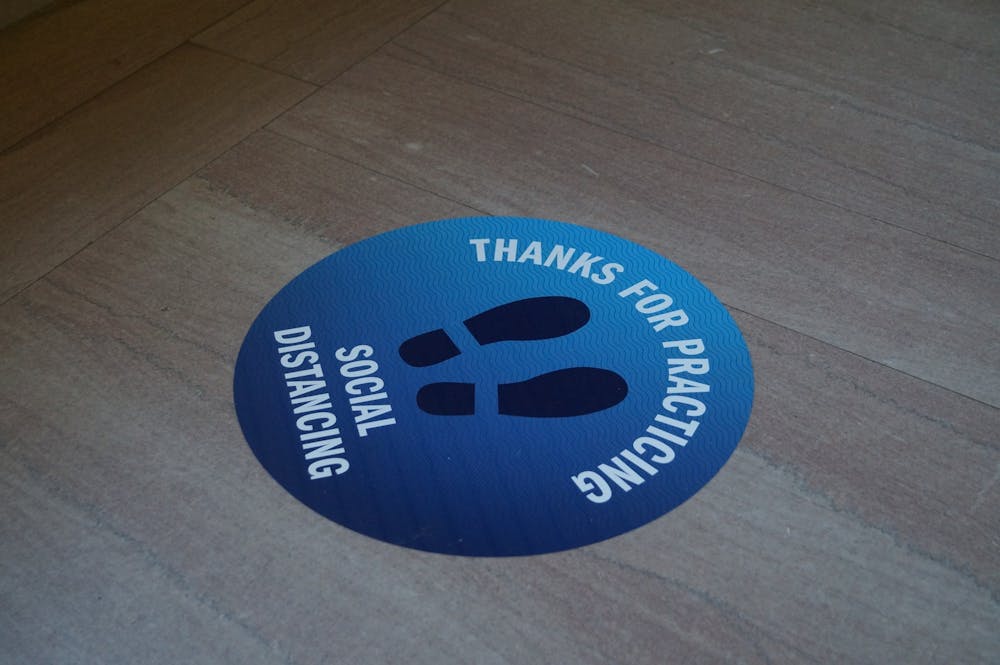
Courtesy Sophie Roehse
“I do think it would be more effective if the University itself held students accountable and just cut UJC out of COVID-19-related sanctions,” Liu said. “The scale of non-compliance last semester was far too large for any student organization to process, especially a group of students who were not being paid.”
Cox said that handling COVID-19-related compliance issues is “difficult” due to the higher number of cases the body is required to adjudicate, though she was quick to add that UJC has an “extremely strong exec team and general body that foresaw this challenge and has responded by putting in an immense amount of time and effort into making sure that cases are heard in a timely manner without sacrificing student’s rights.”
Cox said she can only ask the University to communicate effectively with the student body about their expectations of behavior. On Feb. 24, UJC released a statement in regards to the spike of COVID-19 cases seen at the University the week of Feb. 15 when over 700 cases were reported. The statement acknowledges “that inadequate oversight by University administration … [has] directly negatively impacted our community,” as UJC has been forced to adapt to heightened caseloads as it bears the responsibility for adjudicating COVID-19-related violations.
“I cannot speak for the University itself, but as a leader of a student governance organization, it is my opinion that the University has an obligation to be transparent and clear in its communication to students about what is classified as a COVID violation and possible punishments if you fail to comply with said local, state, federal and University policy,” Cox said.
But ultimately, she believes the responsibility lies on students to be aware of and follow these COVID-19 guidelines.
“The responsibility of students is on an individual level,” Cox said. “I believe that the student themself has the obligation to adhere to policy in order to protect themselves, their peers and the broader Charlottesville community.”
However, others think differently.
“Student self-governance and the Community of Trust are being used as scapegoats for the inevitable spike in COVID-19 cases in Charlottesville due to U.Va.’s reopening,” Liu said. “The sole party accountable for that fact that U.Va. is reopening in the first place is the University itself.”

